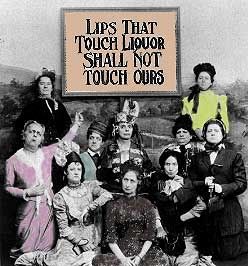Backed by pietistic Protestant denominations, the movement for prohibition began in the 1840s. Those who were for prohibition were called "dries," and those against it "wets." Dries included Methodists, Northern and Southern Baptists, Presbyterians, Disciples of Christ, Congregationalists, Quakers, and Scandinavian Lutherans. Wets included Episcopalians, German Lutherans, and Roman Catholics.
The Civil War slowed the outlawing of alcohol, but it saw popularity again under the banner of the Prohibition Party and the Woman's Christian Temperance Union, founded in 1869 and 1873 respectively. One fervent supporter, Carrie Nation, drew attention by scolding saloon customers and wielding a hatchet at liquor bottles.
Prohibition, or "The Noble Experiment," lasted from 1920 to 1933. In 1917, the Senate proposed the Volstead Act, a national ban of sale, manufacture, and transportation of alcohol. Despite Woodrow Wilson's veto, the Eighteenth Amendment was ratified in 1919 and put into effect the following year. The passing of the Eighteenth Amendment produced thousands of speakeasy clubs and increased underground criminal activity.
In 1933, Roosevelt amended the Volstead Act to allow the manufacture of certain kinds of alcohol, and it was later entirely repealed in 1933.


No comments:
Post a Comment